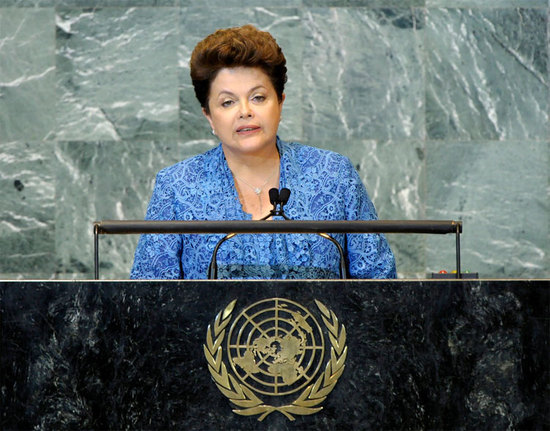In 1965 the UN General Assembly issued a Westphalian-sounding ‘Declaration on the Inadmissibility of Intervention into the Domestic Affairs of States’:
“No state or group of states has the right to intervene directly or indirectly, for any reason whatever, in the internal or external affairs of any other state. Consequently, armed intervention and all other forms of interference or attempted threats against the personality of the state or against its political, economic and cultural elements are in violation of international law. No state may use or encourage the use of economic, political or any other type of measure to coerce another state in order to obtain from it advantages of any kind. Also, no state shall organize, assist, foment, incite, or tolerate subversive terrorist or armed activities directed towards the violent overthrow of or civil strife in another state.”
Less than 35 years later, however, then UN Secretary General Kofi Annan famously argued in an article in The Economist that “state sovereignty, in its most basic sense, is being redefined—not least by the forces of globalization and international co-operation. States are now widely understood to be instruments at the service of their peoples, and not vice versa.”
Yet while the concept of the Responsibility to Protect (R2P), which he was referring to in his article, has turned into a household concept of international politics over the past decade, emerging powers have traditionally rejected it on the grounds that it sought to legitimize interest-driven Western military interventions. Most of the time, therefore, those in favor and those opposed to R2P were not talking to each other, thus reducing R2P’s impact on foreign policy.
Those who saw the UNSC Resolution 1973 (which cleared the way to intervene in Libya) as a breakthrough for R2P were proven wrong when Brazil, India and South Africa (IBSA) sharply criticized the way the P3 (France, Great Britain and the United States) handled the intervention, charging that the resolution had been used as an excuse for regime change. In addition, they complained that once the resolution had passed, P3 diplomats arrogantly dismissed IBSA diplomat’s enquiries about the details of military action, showing little interest in finding a common strategy.
This negative experience caused Brazil to develop the concept of the Responsibility While Protecting (RWP), which seeks to complement R2P by establishing additional criteria to assure that interventions by force always do the smallest damage possible. The concept note published by the Brazilian government in late 2011 rebukes the way the P3 acted in Libya and calls for greater accountability and consultation with the UN Security Council once the use of force has been authorized.
In late August, the Center for International Relations at Fundação Getulio Vargas (FGV) convened leading academics and policy makers from around the world to debate RwP and the potential impact it could have on the debate. The discussion not only revolved around technical questions (e.g., “who evaluates the threat?”, “could the UNSC be given operational control over a military intervention?”), but participants also discussed ways Brazil and other governments could help promote the concept (it remains little known outside a small group of specialists, as Patrick Quinton-Brown argues here.)
Thomas Wright, a fellow at the Brookings Institution and one of the workshop participants in Rio de Janeiro, expressed skepticism in a recent article in Foreign Policy, pointing out that instead of taking the debate forward, RwP could cause paralysis as the West would most likely see it as a means to make humanitarian intervention impossible.
Yet he also noted that RwP forms a part of the Secretary General’s Report on R2P, which is to be discussed at the UN in September. This shows that the concept cannot be dismissed easily.
Just as important as RwP’s content may be its origin. The debate about sovereignty and intervention pits two worlds against each other which seem often unable to communicate properly. Most rich Western nations support R2P, while non-Western poor nations reject it. Analysts from developing countries argue that in practice, R2P does not redefine sovereignty in general, but creates two types of sovereignty: that of the strong and that of the weak, the latter enjoying a much watered-down version of it.
RwP is thus significant because it emerged in the Global South, from a country whose perspective on sovereignty is much more aligned with that of the developing world than with that of NATO. As a consequence, it could help bring the two opposing sides to the table and help create the framework for a constructive debate.
Brazil’s major challenge is twofold. First, it needs to explain RwP in a more detailed way. This could be done by launching a second, more comprehensive concept note. Secondly, Brazil needs to do more to promote the idea. Dilma Rousseff’s opening speech in the UN General Assembly on September 18 is a golden opportunity to do just that.
The President would almost certainly draw fire from many sides – NATO members would accuse her of obstructing swift interventions, the developing world would accuse her of giving in to a Western interventionist agenda. Yet, RwP may be the world’s best hope to avoid returning to the days of UNSC stalemate in which the only two options are inaction in the face of large-scale killings and action outlawed by the U.N. Charter.
Read also:
Emerging Powers and the Responsibility to Protect
Brazil and the future of the Responsibility to Protect (R2P)
Emerging powers remain divided on R2P and RwP
Photo credit: United Nations









